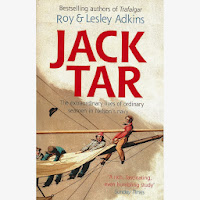Every cartoon about seamen and sailors and many a horror story is built on the old adage of 'no women on board'. Someone might know where the saying comes from, I certainly don't. What I do know is that is wrong. This book will tell you why.
Jack Tar: Life in Nelson’s Navy by Roy and Lesley Adkins was published by Little, Brown. The book tells the story of the ruthless conscription drives leading to the victories of Nelson’s navy in the Napoleonic Wars. Revealing the hands-on methods of getting men on board and describing the shocking living conditions there, it also unveils the startling truth about women on board.
Life on board ship at the time of Nelson’s navy was miserable. Seamen were housed below decks in confines so small modern law would forbid housing chickens in them. Add measly pay, strict order and even stricter discipline with severe punishments attached to any breach, and you will arrive at a low eagerness level to join for anyone of their own free will. And food on board wasn’t first class either.
The typical food for Nelson's seamen is not what I recommend for your Christmas dinner. Breakfast would have consisted of burgoo made of boiled oatmeal seasoned with salt, sugar, and fat. Available with it was Scots’ coffee made from ships biscuits that were burnt to charcoal, crushed, and mixed with water. Lunch was soup or stew containing whatever was handy or available. In the evening there were dry biscuits with fat and cheese. The biscuits were infested with weevils which had to be knocked out first. Nobody would trouble over the weevils when burning the biscuits for Scots' coffee, though. All these delicacies were washed down with many pints of stale beer.
To fill the many job offers, press gangs roamed the port towns for likely willing and but primarily useful candidates. By law they were constrained to seafaring men. But as they had to fill a quota, they didn’t bother with such niceties and just took anybody able to walk. The seamen were thereafter held like prisoners on board ship to keep them from defecting as soon as the recruiters’ backs were turned.
For the families at home, it meant that men wouldn’t come back for months or even years. They faced a future without any income and certain poverty. Over this plight, many women chose to be smuggled on board to become helpers. The scope of work these women did on ships was astounding. From obvious tasks like tending the sick or wounded, they often were assistants to the surgeons amputating limbs during battles and made use of their stitching skills treating wounded men.
Many women became active during battle, too, doubling up as powder monkeys, carrying the powder to the cannons, and quite a few took part in battles like any of the men. These were not the dramatic and cross dressing women hailed in many historically inaccurate films, just the ordinary heroine on board ship.
The book takes its many tales from letters written at the time. The authors thoroughly investigated the archives while working on the book. It’s an interesting work, full of surprises and rich in detail. I liked it a lot for being informative and spellbinding at the same time. There is a lot of history, but also a lot of atmosphere bound into its pages. As an added plus, it gives explanations on many expressions we still use today, such as getting a square meal, getting scuppered, pipe down, or starting on a clean slate.
After the Battle at Trafalgar, many ships were decommissioned. Their cannons were placed as bollards in the streets, upturned and with a cannonball in the mouth, a design we all still know. Like the cannons, the crew ended up in the streets without work, money, or future. The ships were converted into floating prisons. Former crew members had to resort to crime to survive and too often they were caught and sentenced. Their sentences meant serving their time in prisons made out of the decommissioned ships they had served on during the war.
Further reading
Surviving Shipwreck Three Times
The Pirates of Barbary Coast
Lost and Found: Britannic's Organ

No comments:
Post a Comment